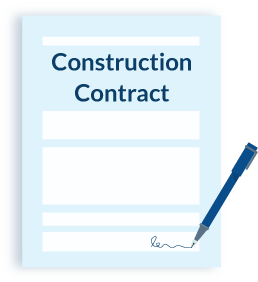
A construction contract is an agreement that lays out the details of a transaction in clearly understood terms. Both parties have set obligations that they must meet, money on the table, and skin in the game. Learning construction contract negotiation can be an important piece of a company’s puzzle.
But contractors who emerge victorious from the bidding battles often feel like the odds are against them. It seems like the GC or owner holds all the cards, and there’s no room for negotiation when the contract’s on the table. Remember this: There’s always room for negotiation.
To help contractors hone their negotiation skills, we called upon several bargaining pros for advice. We spoke with construction lawyers, credit managers, and other construction professionals about fighting for your rights during a construction contract negotiation. Here are eight tips on how to negotiate a construction contract.
8 tips for construction contract negotiation
Negotiating during the contract phase can be a bit nerve-wracking. In most cases, the owner or GC already has what they say they’re willing to offer clearly outlined, and they’re attempting not to show a soft spot in the armor. But, just the mere act of pushing back can be enough to open some discussion.
In her course, The Foundations of Construction Credit, Thea Dudley teaches people that standing up for yourself is the first step. “Most people don’t ask questions. And if your reputation is good, and you’ve got that quality of work, and you’ve got that relationship, they’re going to compromise with you,” stated Dudley.
She continued, “They might bow up, they might threaten to go elsewhere, and you may genuinely lose some customers, but typically they come back.”
The point is that while it might feel awkward or difficult, the end result is often a better contract for your company. With that mindset, utilizing the following tips will help you negotiate your future construction contracts.
1. Know the state laws
Many times, just having more knowledge of the state laws than the owner or GC can give you a significant boost in negotiation juice. If an owner isn’t aware of the laws governing contract language in your state, it might be because they’re either new to the industry or they typically work elsewhere. As a result, they might include language that doesn’t jive with state requirements.
Scott Grier, an 11-year attorney practicing with Rouse, Frets, White, Goss, Gentile, Rhodes, PC in Kansas, Missouri, and Oklahoma, knows the importance of accurate language.
Scott believes that non-conforming contract language and other state statutes can be a foot in the door to renegotiation.
“The Kansas Anti-Indemnity Act and the Kansas Fairness in Private (and Public) Construction Contract Acts provide rules concerning indemnity language, payment terms, choice of law, and venue,” Scott said. “We have successfully negotiated revised terms after we made the client’s customer aware of the specific state requirements.”
2. Be honest about the risk
Risks abound on typical construction projects. Owners like to manage that risk by shifting as much of it as possible onto the GC, and the GC wants to put it all on the sub. And neither the owner nor the GC wants to pay the sub for that risk their taking. Addressing that head-on is a negotiation tactic that could pay dividends.
We asked 40-year construction attorney Carol A. Sigmond, who practices in New York, D.C., Maryland, and Virginia with Porzio, Bromberg, & Newman, about her thoughts on risk.
“If you place too much risk on the contractor, the job will go slowly as the contractor will stop to have every decision placed before ownership as a change order.” Carol said. “I have been most successful for contractors when I put this issue squarely on the table and ask the owner or developer side to consider options.”
Carol leans on the hit this could have on the bottom line: “I have changed minds by pointing out the impact of this type of delay on the cost of the construction loan or other time concerns.”
3. Understand the project owner’s needs
When it comes to signing contracts, owners and GCs often suffer from tunnel vision. They want to saddle the subcontractor with strict requirements in hopes of finishing the project on time. The problem is that tunnel vision prevents them from seeing the big picture, sometimes causing them to cut off their nose to spite their faces. It’s an opportunity to negotiate.
Bruce A. Inosencio, Jr. of Inosencio & Fisk, PLLC, a 25-year construction attorney in Michigan and Florida, explained this scenario perfectly: “During negotiations for a large school construction project, we were negotiating the timing and processing of change orders. The customer — the project’s general contractor — wanted to impose a very strict timeline on change order approval.”
Bruce knew that the school board wanted input and that it would slow the process down considerably. He added, “The project’s general contractor eventually realized that they could work with us, and their subcontractors, by revising their strict contract language and reaching terms that were acceptable to everyone involved.”
4. Clarify the change order process
Change orders can be a point of contention, especially for inexperienced GCs or owners who don’t understand how they work. If the contract doesn’t explicitly state the change order process, it’s best to nail it down in a contract revision. This alone could open up the door to a conversation about other points in the contract, but it will certainly help avoid a dispute down the road.
Deep dive: How Change Orders Work in Construction (with Free Template Download)
“It’s best to commit them to writing, when feasible,” is what Samuel H. Levine, a 39-year Illinois attorney with Bryce, Downey, & Lenkov LLC, told us about change orders.
He added, “I was negotiating a change order. I persuaded the customer to understand the value of the change order and the need to commit it to writing so everyone understood the expectations of the parties.” That’s a point worth negotiating into a construction contract.
5. Make the process feel collaborative
A successful negotiation is not about winning and losing. It’s about both parties walking away from the table feeling good about the deal. The best way to ensure the owner or GC feels good is by making the process feel as collaborative as possible.
When speaking to David Adelstein, an 18-year construction attorney at Kirwin Norris in Florida, he told us that after an initial round of red lines and notes, he sets up a video conference with everyone involved.
“I like clients to be involved because there are business decisions that need to be considered,” David said. “The call facilitates a productive dialogue where each side can appreciate the other’s risk, and it promotes acceptance, rejection, or compromising language so that risk is sufficiently factored in and shared.”
David also had this interesting point to make: “The issue isn’t so much as changing their mind but making someone else appreciate the risk and position so that the risk can be factored in on the frontend and can be weighed by the parties.”
6. In a pinch, use a Memorandum of Understanding
There are certain situations when it’s just not possible to negotiate an equitable contract before work must begin. In those situations, you’re better off using a Memorandum of Understanding to mark the terms to commence work than signing a contract that doesn’t benefit you.
Attorney Jonathan Forester of Riess LeMieux makes this point clear as daylight. He stated the first thing that needs to happen is a contract-wide slowdown.
“Number one: Pump the brakes,” he said, adding, “If there really is a time-sensitive issue, you can do a quick one- or two-page Memorandum of Understanding, saying ‘These are the general terms…’.”
Jonathan states Memorandums of Understanding don’t take long, and they can do a world of good: “I can throw one of those in writing within an hour, and you can be on your way, and you’ve got something in writing to protect you.”
7. Talk less. Listen more.
Whether it’s a construction contract or a full-fledged hostage situation, there’s one truth to constructive negotiation: Everyone wants to be heard. By talking less, allowing the conversation to develop, and truly listening, you’ll have a better understanding of what your customer needs.
Anne Scarcella, a Territory Credit Manager for Crawford Electrical Supply, believes this is an extremely helpful tactic during contract negotiations. “There is a reason we have two ears and one mouth,” Anne quotes old saying before going on: “I think the thing we need to do when negotiating with a customer is to listen more and speak less. You will learn right where your customer is if you just let the conversation progress and listen to what is being said.”
8. Start high when money’s on the line
Once you give something up in contract negotiation, it’s tough to get it back. Many times, savvy negotiators will enter the conversation with concessions they’re willing to make already in mind. Often, that concession is a dollar amount. When money’s the topic of discussion, don’t shortchange yourself.
“Start high. You can always come down, but you can never go back up,” is some sage advice offered to us from Toby Brutsman, the Regional Credit Manager with Morsco. Having a number to comfortably work down from is a much better position to be in than starting the project with your back against the financial wall.
Put your new understanding into action
Now that you’re armed with this new understanding of construction contract negotiation, you’re ready to put these tactics into action.
Remember that the majority of subs and contractors don’t push the contract back across the table. Your ability to stand up for your rights and negotiate a fair deal could make the difference between an okay business and a great company.

